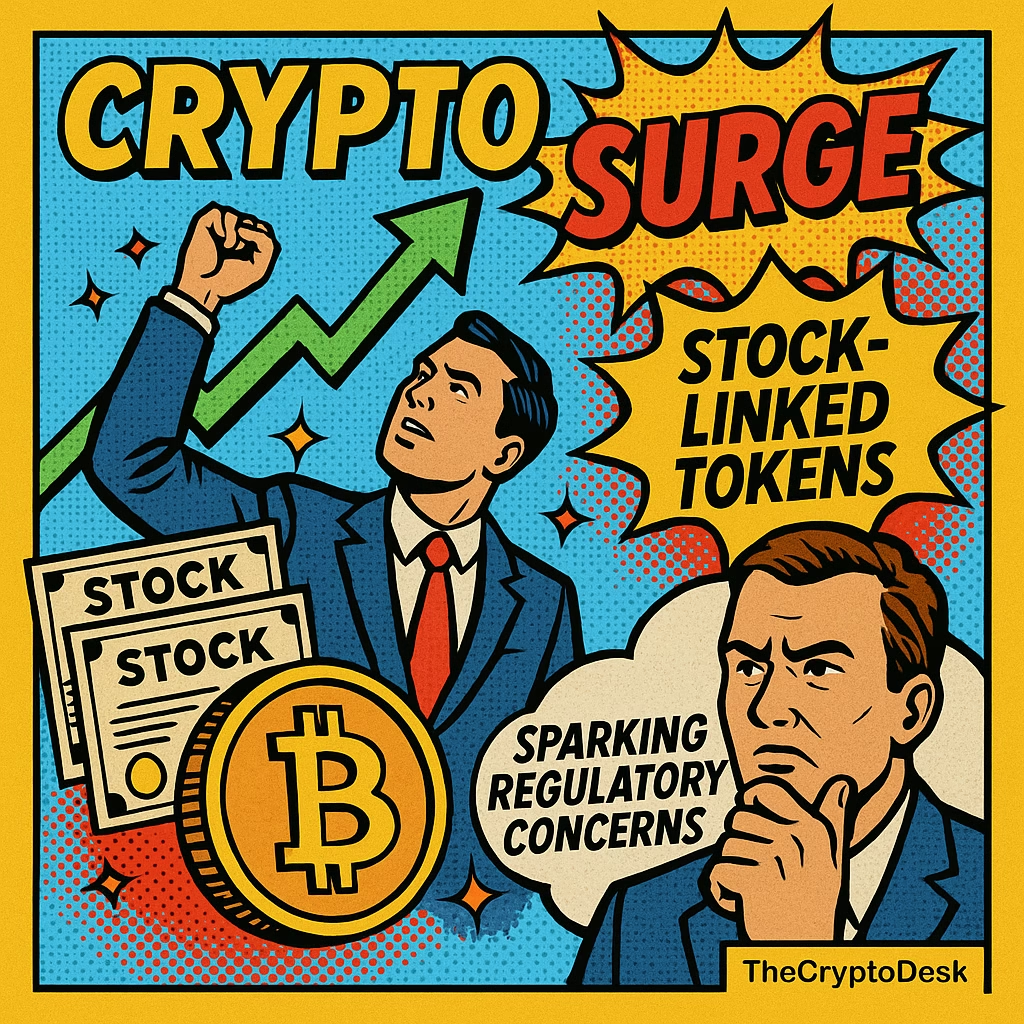In recent weeks, the cryptocurrency landscape has witnessed a remarkable surge of interest, particularly in the intersection of traditional finance and the booming world of blockchain. A growing number of cryptocurrency firms are diligently working to bring tokenized versions of real-world stocks to market. While this innovation has captivated investor attention, it has simultaneously ignited a wave of anxiety among regulators and major financial institutions who caution that this unregulated arena may expose investors to hidden and potentially significant risks.
Imagine a marketplace where stocks can be traded around the clock, just like cryptocurrencies. This is the vision major players such as Robinhood, Gemini, and Kraken are pursuing as they spearhead the push for tokenized stocks. Their efforts are not just confined to European markets; companies like Coinbase and emerging startups like Dinari are actively seeking regulatory approval in the United States for similar offerings. Even the iconic Nasdaq has entered the fray, contemplating plans to introduce tokenized shares, highlighting the growing mainstream interest in this novel trading approach.
Why This Matters
The burgeoning market for tokenized public stocks has exploded, surging from mere millions to a staggering $412 million within the span of a year, according to figures from RWA.xyz. This rapid growth raises crucial questions about the implications for both investors and the overall integrity of financial markets. Proponents of tokenization argue that by incorporating blockchain technology into traditional equity trading, we could witness a transformation that prioritizes transparency, boost efficiency, and broaden access to financial opportunities.
However, while there are undoubtedly advantages to tokenization, it’s essential for potential investors to be aware of the pitfalls. Many tokens issued in this context lack the legal protections that accompany conventional shares, such as ownership rights and voting privileges. Instead, they often function as derivatives, pushing the onus onto investors to understand the intricacies of what they are really purchasing. As Diego Ballon Ossio from Clifford Chance aptly remarked, “You’re buying exposures to those shares through synthetic instruments.”
Some issuers, like Ondo Finance and Dinari, claim to back their tokens with real stocks on a 1:1 basis, while others merely attempt to replicate price exposure without the underlying ownership. This discrepancy illustrates a crucial aspect of the current landscape that investors must navigate. In a notable instance, Robinhood faced backlash when it attempted to tokenize stock linked to OpenAI, prompting significant backlash after the AI company disclosed it had not authorized the listing.
TVL of real-world assets is up 2X since January. 20X since 2023. Currently it sits at $16.894 billion. This is what parabolic adoption looks like. The total addressable market sits in the trillions. Tokenization is simply a superior way to store and transfer assets: •… pic.twitter.com/3JNCHs9C9k— Patrick Scott | Dynamo DeFi (@patfscott) October 7, 2025
As discomfort grows on Wall Street, firms like Citadel Securities are advocating for stricter regulatory oversight, cautioning that the rise of tokenization could siphon liquidity from public markets. Yet, amidst the turmoil, supporters like Kraken and Ondo Finance maintain that a well-structured tokenization framework could lead to enhanced transparency and improved investor safeguards.
Expert Opinions
Insights from industry experts reveal a nuanced perspective on the future of tokenized stocks. The World Federation of Exchanges has called for tighter regulations but also supports responsible, regulated initiatives like Nasdaq’s plans. The potential for innovation is enormous, but without proper oversight, the risk remains high.
In a compelling research study, Animoca Brands projected that the tokenization of real-world assets (RWAs) could unlock an astonishing $400 trillion market in traditional finance. Their researchers, Andrew Ho and Ming Ruan, emphasized that the comprehensive market for private credit, treasury debt, commodities, stocks, alternative funds, and bonds represents an expansive growth opportunity. They noted, “The estimated $400 trillion addressable TradFi market underscores the potential growth runway for RWA tokenization.”
Meanwhile, the Skynet RWA Security Report anticipates that the market for tokenized RWAs could escalate to a remarkable $16 trillion by 2030, with tokenized U.S. Treasuries alone expected to reach a value of $4.2 billion this year, driven primarily by short-term government bonds. This surge in institutional interest highlights the increasing involvement of major banks, asset managers, and blockchain-native firms, all eager to explore tokenization as a means of yield generation and liquidity management.
Future Outlook
As we peer into the future, the landscape of tokenized stock trading will undoubtedly continue to evolve. With major players pushing for integration into established financial frameworks, the potential to revolutionize investing practices looms large. However, it’s crucial for investors to remain vigilant and informed as this exciting yet complex new world unfolds. Tokenization, if done correctly, could redefine how we access and engage with financial markets, but it also carries responsibilities and risks that cannot be overlooked.
In conclusion, while the allure of tokenized assets paints a promising picture of financial democratization, it is essential for all participants in this emerging space to proceed with caution. Are you ready to dive into the tokenization wave, or will you stand on the sidelines and watch as the future of investing unfolds? The choice is yours.
